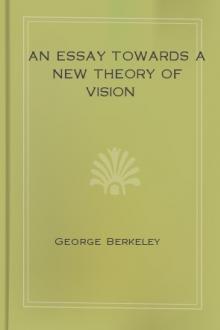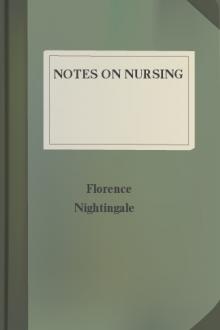An Essay Towards a New Theory of Vision by George Berkeley (the little red hen ebook txt) 📖

- Author: George Berkeley
- Performer: -
Book online «An Essay Towards a New Theory of Vision by George Berkeley (the little red hen ebook txt) 📖». Author George Berkeley
144. It must be confessed that we are not so apt to confound other signs with the things signified, or to think them of the same species, as we are visible and tangible ideas. But a little consideration will show us how this may be without our supposing them of a like nature. These signs are constant and universal, their connexion with tangible ideas has been learnt at our first entrance into the world; and ever since, almost every moment of our lives, it has been occurring to our thoughts, and fastening and striking deeper on our minds. When we observe that signs are variable, and of human institution; when we remember there was a time they were not connected in our minds with those things they now so readily suggest; but that their signification was learned by the slow steps of experience: this preserves us from confounding them. But when we find the same signs suggest the same things all over the world; when we know they are not of human institution, and cannot remember that we ever learned their signification, but think that at first sight they would have suggested to us the same things they do now: all this persuades us they are of the same species as the things respectively represented by them, and that it is by a natural resemblance they suggest them to our minds.
145. Add to this that whenever we make a nice survey of any object, successively directing the optic axis to each point thereof, there are certain lines and figures described by the motion of the head or eye, which being in truth perceived by feeling, do nevertheless so mix themselves, as it were, with the ideas of sight, that we can scarce think but they appertain to that sense. Again, the ideas of sight enter into the mind several at once, more distinct and unmingled than is usual in the other senses beside the touch. Sounds, for example, perceived at the same instant, are apt to coalesce, if I may so say, into one sound: but we can perceive at the same time great variety of visible objects, very separate and distinct from each other. Now tangible extension being made up of several distinct coexistent parts, we may hence gather another reason that may dispose us to imagine a likeness or an analogy between the immediate objects of sight and touch. But nothing, certainly, doth more contribute to blend and confound them together than the strict and close connexion they have with each other. We cannot open our eyes but the ideas of distance, bodies, and tangible figures are suggested by them. So swift and sudden and unperceived is the transition from visible to tangible ideas that we can scarce forbear thinking them equally the immediate object of vision.
146. The prejudice which is grounded on these, and whatever other causes may be assigned thereof, sticks so fast that it is impossible without obstinate striving and labour of the mind to get entirely clear of it.
But then the reluctancy we find in rejecting any opinion can be no argument of its truth to whoever considers what has been already shown with regard to the prejudices we entertain concerning the distance, magnitude, and situation of objects; prejudices so familiar to our minds, so confirmed and inveterate, as they will hardly give way to the clearest demonstration.
147. Upon the whole, I think we may fairly conclude that the proper objects of vision constitute an universal language of the Author of Nature, whereby we are instructed how to regulate our actions in order to attain those things that are necessary to the preservation and well-being of our bodies, as also to avoid whatever may be hurtful and destructive of them. It is by their information that we are principally guided in all the transactions and concerns of life. And the manner wherein they signify and mark unto us the objects which are at a distance is the same with that of languages and signs of human appointment, which do not suggest the things signified by any likeness or identity of nature, but only by an habitual connexion that experience has made us to observe between them.
148. Suppose one who had always continued blind be told by his guide that after he has advanced so many steps he shall come to the brink of a precipice, or be stopped by a wall; must not this to him seem very admirable and surprizing? He cannot conceive how it is possible for mortals to frame such predictions as these, which to him would seem as strange and unaccountable as prophesy doth to others. Even they who are blessed with the visive faculty may (though familiarity make it less observed) find therein sufficient cause of admiration. The wonderful art and contrivance wherewith it is adjusted to those ends and purposes for which it was apparently designed, the vast extent, number, and variety of objects that are at once with so much ease and quickness and pleasure suggested by it: all these afford subject for much and pleasing speculation, and may, if anything, give us some glimmering analogous prenotion of things which are placed beyond the certain discovery and comprehension of our present state.
149. I do not design to trouble myself with drawing corollaries from the doctrine I have hitherto laid down. If it bears the test others may, so far as they shall think convenient, employ their thoughts in extending it farther, and applying it to whatever purposes it may be subservient to: only, I cannot forbear making some inquiry concerning the object of geometry, which the subject we have been upon doth naturally lead one to.
We have shown there is no such idea as that of extension in abstract, and that there are two kinds of sensible extension and figures which are entirely distinct and heterogeneous from each other. Now, it is natural to inquire which of these is the object of geometry.
150. Some things there are which at first sight incline one to think geometry conversant about visible extension. The constant use of the eyes, both in the practical and speculative parts of that science, doth very much induce us thereto. It would, without doubt, seem odd to a mathematician to go about to convince him the diagrams he saw upon paper were not the figures, or even the likeness of the figures, which make the subject of the demonstration. The contrary being held an unquestionable truth, not only by mathematicians, but also by those who apply themselves more particularly to the study of logic; I mean, who consider the nature of science, certainty, and demonstration: it being by them assigned as one reason of the extraordinary clearness and evidence of geometry that in this science the reasonings are free from those inconveniences which attend the use of arbitrary signs, the very ideas themselves being copied out and exposed to view upon paper. But, by the bye, how well this agrees with what they likewise assert of abstract ideas being the object of geometrical demonstration I leave to be considered.
151. To come to a resolution in this point we need only observe what hath been said in sect. 59, 60, 61, where it is shown that visible extensions in themselves are little regarded, and have no settled determinable greatness, and that men measure altogether, by the application of tangible extension to tangible extension. All which makes it evident that visible extension and figures are not the object of geometry.
152. It is therefore plain that visible figure are of the same use in geometry that words are: and the one may as well be accounted the object of that science as the other, neither of them being otherwise concerned therein than as they represent or suggest to the mind the particular tangible figures connected with them. There is indeed this difference between the signification of tangible figures by visible figures, and of ideas by words: that whereas the latter is variable and uncertain, depending altogether on the arbitrary appointment of men, the former is fixed and immutably the same in all times and places. A visible square, for instance, suggests to the mind the same tangible figure in Europe that it doth in America. Hence it is that the voice of the Author of’
Nature which speaks to our eyes, is not liable to that misinterpretation and ambiguity that languages of human contrivance are unavoidably subject to.
153. Though what has been said may suffice to show what ought to be determined with relation to the object of geometry, I shall nevertheless, for the fuller illustration thereof, consider the case of an intelligence, or unbodied spirit, which is supposed to see perfectly well, i.e. to have a clear perception of the proper and immediate objects of sight, but to have no sense of touch. Whether there be any such being in Nature or no is beside my purpose to inquire. It sufficeth that the supposition contains no contradiction in it. Let us now examine what proficiency such a one may be able to make in geometry. Which speculation will lead us more clearly to see whether the ideas of sight can possibly be the object of that science.
154. FIRST, then, it is certain the aforesaid intelligence could have no idea of a solid, or quantity of three dimensions, which followeth from its not having any idea of distance. We indeed are prone to think that we have by sight the ideas of space and solids, which ariseth from our imagining that we do, strictly speaking, see distance and some parts of an object at a greater distance than others; which hath been demonstrated to be the effect of the experience we have had, what ideas of touch are connected with such and such ideas attending vision: but the intelligence here spoken of is supposed to have no experience of touch. He would not, therefore, judge as we do, nor have any idea of distance, outness, or profundity, nor consequently of space or body, either immediately or by suggestion. Whence it is plain he can have no notion of those parts of geometry which relate to the mensuration of solids and their convex or concave surfaces, and contemplate the properties of lines generated by the section of a solid. The conceiving of any part whereof is beyond the reach of his faculties.
155. Farther, he cannot comprehend the manner wherein geometers describe a right line or circle; the rule and compass with their use being things of which it is impossible he should have any notion: nor is it an easier matter for him to conceive the placing of one plane or angle on another, in order to prove
 A very interesting statement of one of our contemporaries is that any person, to one degree or another, is both a psychologist and a philosopher - they say, life forces him to. On the one hand, the main driving force of every person is the craving for knowledge, the desire to reach certain social heights, the desire to be wise in any everyday situations - and this is the philosophy of life.
A very interesting statement of one of our contemporaries is that any person, to one degree or another, is both a psychologist and a philosopher - they say, life forces him to. On the one hand, the main driving force of every person is the craving for knowledge, the desire to reach certain social heights, the desire to be wise in any everyday situations - and this is the philosophy of life. 




Comments (0)